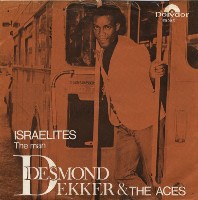
Back in the 1970s and 80s, TV adverts were far more memorable than they are these days and it was usually because of the music that accompanied them. This week’s suggested was used, to promote two different products. In 1989, Vitalite margarine used it to great effect when it came bounding in with the words (on screen), ‘Wake up in the morning, wantin’ me breakfast, what sunflower spread do I lay on ma bread’ but seven years before that, it was used to advertise Maxell cassette tapes and how clear the quality of this product was. Even to this day, over 40 years later, people still sing the adapted words from that advert.
The Maxell ad parodied the Bob Dylan promo video to Subterranean Homesick Blues where hand written lyrics were being discarded on to the floor by Dylan himself. In the Maxell ad, it was a black man on screen doing the same with the lyrics, ‘Get up in the morning, sleeping for bread sir, sold out to every monk and beef-head, oh-oh, me ears are alight’. It was rare for black people then to appear in television adverts and it was the last line that Lenny Henry picked up on and used in his comedy sketches. The last two cards on that ad said, ‘I think that’s what he says’ and, ‘But I need to hear it on a Maxell tape’. Black people were delighted that their own were more prominent on television.
Desmond Dekker was born Desmond Dacres in Kingston, Jamaica and regularly went to church with his grandmother. He was a religious man and loved singing hymns. He grew up a shy man which would account for the lack of deeper information about him in reference books and online. His mother died young and Dekker moved north to St Mary’s where he initially embarked on an apprenticeship as a tailor before returning to Kingston and then taking up a job as a welder. In 1961, at the age of 20, he auditioned successfully for the Jamaican producer Leslie Kong with his own song, Honour Your Mother and Father that had been inspired by a Bible passage. He then introduced one of his fellow welders, Bob Marley, to Kong. Marley then recorded Dekker’s song Honour Your Mother and Father which became a local hit. Dekker and Marley remained friends until Marley’s death in 1981.
In 1966, Dekker formed his band, The Aces who were Wilson James and the four brothers, Barry, Carl, Clive and Patrick Howard and began working regularly with Kong up until his death in 1971 from a heart attack at the age of just 38.
Kong and Dekker wrote Israelites together when Kong was still running a record store, “It all happened so quickly. I didn’t write that song sitting around a piano or playing a guitar,”, Dekker said in an interview with The Metro newspaper in 2005. “I was walking in the park, eating corn. I heard a couple arguing about money. She was saying she needed money and he was saying the work he was doing was not giving him enough. I relate to those things and began to sing a little song, ‘You get up in the morning and you slaving for bread.’ By the time I got home it was complete. It was so funny, that song never got out of my mind. It stayed fresh in my head. The following day I got my little tape and I just sang that song and that’s how it all started.”
Dekker signed to Pyramid records, a label owner by an Australian businessman called Graeme Goodall and was Leslie Kong’s outlet in the UK, and he first broke through in 1967 with 007 (Shanty Town), but the following year, Israelites, not THE Israelites as everyone says, was getting popular in the clubs in London and entered the UK chart in March 1969, five weeks later it went to number one and became the first reggae song to do so. There were other reggae songs around; The Bedrocks’ reggae cover of the Beatles’ Ob-La-Di, Ob-La-Da had just gone out of the chart, but just about to enter was Max Romeo’s Wet Dream which was so controversial that Radio 1 DJ’s were not even allowed to say its title. In 1975, Israelites was re-issued, this time on the Cactus label, a subsidiary of Creole records, as Pyramid had folded in 1968 and was back in the chart for nine more weeks peaking at number 10. Bizarrely, this time there was no credit for the Aces.
Desmond almost made it a double (Dekker) when the follow-up, It Miek, went into the Top 10. It Miek was also controversial as it was said to be rude Jamaican patois, but it was simply a reference to fate. In 1970, he went to number two with You Can Get It If You Really Want, which was written and first recorded by Jimmy Cliff. Dekker’s version uses the same backing tracks a Jimmy’s Cliff’s original. Enjoying the puns on his name, he released an album, Black And Dekker, in 1980.
Israelites has been covered by Typically Tropical, Eddy Grant’s brother, Rudy, Madness and Apache Indian, the Clash were big fans of the song and although they never recorded it, they regularly used it in rehearsals and for soundchecks.
Dekker, who permanently moved to the UK in 1969, enjoyed a resurgence during the late 70s ska revival but five years later was declared bankrupt. In late 2005, plans were made for a trip to Prague where he was due to be headlining The World Music Festival, but he died of a heart attack in 2006 at age 64 before it happened.